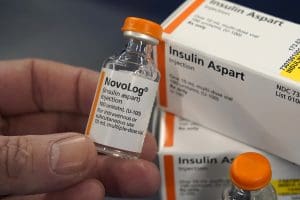Cap on insulin costs could save over a million older Americans an average of $500 per year
A provision in the Inflation Reduction Act caps the cost of insulin for some Medicare recipients starting this year, and Democrats support a similar rule for privately insured Americans as well.

A study released on Tuesday by the Department of Health and Human Services found that people on Medicare could see their annual insulin costs reduced by an annual average of $500 based on a rule within the Inflation Reduction Act.
Insulin costs have increased significantly over the last decade. A 2020 analysis by the Kaiser Family Foundation found that a month’s supply of the vital medicine can cost patients anywhere from $334 to $1,000 per month. According to the Centers for Disease Control and Prevention, diabetes is the seventh-leading cause of death in the United States and the number one cause of kidney failure, adult blindness, and lower-limb amputations.
The Inflation Reduction Act was signed into law on Aug. 16, 2022, by President Joe Biden after having faced unified opposition from Republicans in Congress and advanced with only Democratic votes and a tie-breaking vote in the Senate by Vice President Kamala Harris. A key provision in the law caps insulin costs at $35 per month for certain Medicare recipients.
HHS’ study used survey data about Medicare enrollees in 2019 and 2020 to determine what they had spent on insulin and what they would have had to spend had the IRA cap been in effect at the time.
The results showed that if the law had been in effect in 2020, 1.5 million older Americans covered by Medicare Part D would have saved an average of $484 a year. The study also determined that over 31,300 Medicare Part B and Part D recipients would have saved an average of $501.
“That’s more money in seniors’ pockets and more breathing room for American families,” Biden said in a statement on Tuesday. Biden said the data, in conjunction with recent positive news about employment, reduced inflation, and positive economic indicators, made him “more confident than ever that America’s best days are ahead.”
HHS Secretary Xavier Becerra said in a release: “Thanks to this historic law, people who get their insulin through Medicare won’t have to pay more than $35 for a month’s supply. No one should have to skip or ration their insulin because they can’t afford it.”
As of October 2021, total Medicare enrollment was over 63.9 million, up from 61.5 million during the period that was studied. Increased enrollment in Medicare each year expands the pool of people who can benefit from the new insulin caps.
The benefit is limited to Medicare enrollees, but additional legislative language that would have capped insulin costs for those covered by private insurance was defeated in the Senate on Aug. 8. The vote on the amendment was 57-43, just below the 60 yes votes necessary to adopt it. All of the Democratic caucus voted for the provision, while only seven Republican senators voted in favor of it.
Published with permission of The American Independent Foundation.
Recommended

Biden calls for expanded child tax credit, taxes on wealthy in $7.2 trillion budget plan
President Joe Biden released his budget request for the upcoming fiscal year Monday, calling on Congress to stick to the spending agreement brokered last year and to revamp tax laws so that the “wealthy pay their fair share.”
By Jennifer Shutt, States Newsroom - March 11, 2024
December jobs report: Wages up, hiring steady as job market ends year strong
Friday’s jobs data showed a strong, resilient U.S. labor market with wages outpacing inflation — welcome news for Americans hoping to have more purchasing power in 2024.
By Casey Quinlan - January 05, 2024
Biden’s infrastructure law is boosting Nevada’s economy. Sam Brown opposed it.
The Nevada Republican U.S. Senate hopeful also spoke out against a rail project projected to create thousands of union jobs
By Jesse Valentine - November 15, 2023








































































